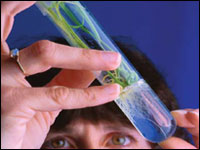
As parents of children with peanut sensitivities well know, awareness of what’s in their kids’ food is of paramount importance.

In order to detect this allergen — and many others — engineers at UCLA have created a system called iTube. It involves placing a small amount of food in a test tube with chemicals, shining a light on it, and then using a smartphone’s camera and a specially-designed app to analyze the light for signs of particular ingredients, such as peanuts, eggs, or other allergens.
iTube is still in the research and development phase, but the technology has been licensed out and may soon be available to the public.
“There are a lot of allergens that people are dealing with, especially for children,” Aydogan Ozcan, an associate professor in the UCLA School of Engineering and Applied Science and one of iTube’s developers, told TechNewsWorld. “For parents, it will be a great tool. It will also be useful for restaurants and airplanes. It’s going to make life easier for a lot of people.”
Users of the app will be able to upload the information to a server, where it could be shared with other users who might be curious about the composition of foods at particular restaurants or other public places.
“It gives users access to a large scale database, and as the number of users of this app increases, it can give people a lot of information,” said Ozcan. “If you want to go to a certain restaurant, you can see what’s being served there.”
The system relies on the high-quality cameras and processing systems in contemporary smartphones to make this highly-accurate and focused chemical detection possible.
“Smartphones have very advanced optical components,” said Ozcan. “Their cameras are very advanced, very high-resolution.”
The app will also determine not just the presence of a certain ingredient, but also its concentration.
“It’s based on the intensity of the transmitted light,” he explained. “The more allergen, the less intense it gets. [The app] quantifies the amount that is present.”
The need for allergen detection is great — both for those with life-threatening allergies and those with dietary sensitivities — and it will be particularly useful to have this detection power in a mobile device.
“There’s a huge need for allergen detection, and cell phones form a unique platform,” said Ozcan. “It’s going to be a very convenient tool.”
Strip Search
Many people are seeking to eliminate gluten from their diets, so there’s a large market for devices for detecting this particular ingredient in foods. One such product is EZ Gluten, which is marketed by ELISA Technologies.
EZ Gluten is a test strip that uses an antibody to detect chemical components of gluten when a sample of food is placed on the strip, and it’s a valuable test for those who need to avoid consuming gluten.

“Gluten shows up in the strangest places,” Laura Allred, president of ELISA Technologies, told TechNewsWorld. “Labeling regulations are not yet in place, and . . . many people are sensitive to gluten.”
The product empowers consumers to know what’s in their foods and other products, which might or might not be labeled as containing gluten.
“We have customers who have tested cosmetics, gasoline, pet foods and many other items that would not be covered under food labeling laws, but which affect them because of their gluten sensitivity,” said Allred. “We realize people can’t and shouldn’t have to test everything they eat, but by verifying that a product is truly gluten-free as advertised, consumers can develop confidence in manufacturers and know which companies and products to trust.”
Higher Up the Food Chain
The most sophisticated food testing technologies are not yet in the hands of consumers, since they require specialized skills and equipment. Much of the testing for allergens and pathogens, therefore, still happens in labs and at manufacturing facilities — in an effort to protect both consumers and the reputation of food producers.

“In the last few years, the international food industry was shaken by numerous scandals that undermined the trust of many consumers,” Marcia Armstrong, scientific affairs manager of global applied testing with food-testing technology manufacturer QIAGEN, told TechNewsWorld. “Food testing technologies help to bridge this industry-consumer gap. From an industry perspective, these technologies primarily help to prevent economic loss through reputation-damaging and costly product recalls.”
Eventually, Armstrong predicts, some of these more highly-sensitive and accurate testing technologies will find their way into the hands of the public.
“Molecular biology is developing rapidly and disseminating into a growing number of applications, so I could certainly envision this possibility at some point in the future,” said Armstrong. “Today, however, employing these kinds of technologies at home is not a viable option, as they require specialized lab expertise and equipment. It is also more efficient to do bulk testing on the manufacturing and retail level.”





















































